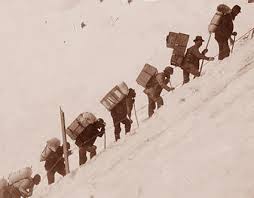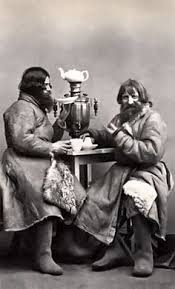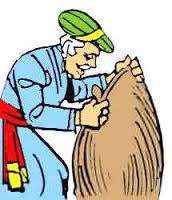Once again I was approaching the Canadian Customs and Immigration station on the Klondike Highway. Looking ahead I could see that the wait would be at least 15 minutes if not longer. We had just crossed the summit of the White Pass, and  I’d been telling the guests on my tour bus about the “one ton rule.” During the 1898 Gold Rush, the Mounties required the Argonauts as the gold seekers were called, to carry an estimated one year supply of food with them as a condition for entering the country. Now as we waited at the border I considered what story I might tell to pass the time as we sat there waiting to show our passports before proceeding into British Columbia and then into the Yukon Territory.
I’d been telling the guests on my tour bus about the “one ton rule.” During the 1898 Gold Rush, the Mounties required the Argonauts as the gold seekers were called, to carry an estimated one year supply of food with them as a condition for entering the country. Now as we waited at the border I considered what story I might tell to pass the time as we sat there waiting to show our passports before proceeding into British Columbia and then into the Yukon Territory.
Then it occurred to me. The border! Why not give the Gold Rush a rest and tell a smuggling story! “Folks,” I confided in a mock conspiratorial tone, “let me tell you…”
I introduced them to Mullah Nasruddin, or the Hodja as he is also known, the often foolish but somehow wise hero of hundreds of tales told in coffee houses across the middle east and beyond.
Once a week Nasruddin crossed the border pushing a wheelbarrow heavily laden with merchandise. One week the wheelbarrow was full of melons, the next week it might have been dates, or bottles of rosewater. Come each Tuesday morning, Nasruddin would faithfully arrive at the crossing, produce the necessary paperwork, the border agent would examine his cargo then wave the Mullah through. But the agent always suspected that Nasruddin was pulling the wool over his eyes and engaged in some kind of smuggling racket. Try as hard as he could though to catch him in the act, the agent couldn’t catch him in the act. Week after week, month after month, and then year after year, a wheelbarrow full of this, that or the other thing and the agent growing increasingly frustrated, sure that Nasruddin was having a great laugh at his expense.
Now it was many years later. Both men had retired and one day they encountered each other sitting at adjacent tables at a coffee house.
“Nasruddin,” you old rascal. “You can tell me now. I have no authority, You’re beyond the reach of the law. All those many years when I would see question you each week, I suspected that you’d been smuggling something . Admit it! Admit it now and ease my mind.
“Oh yes, indeed my friend. It is true. Your suspicions were well founded and I profited greatly each week with my clandestine cargo.”
“Tell me, tell me,! must know or it will drive me crazy! Just what was it that you were smuggling?” the agent fairly begged.
With a great sly grin, Nasruddin replied, “ Wasn’t it obvious? I was smuggling… wheelbarrows!”
I would have occasion to tell it dozen’s of times over the course of the summer while waiting either to cross into Canada or back into Alaska. Once, I even told it to one of the U.S customs officials as we sat at a cafe at adjacent tables in Skagway.
“ That story is truer than you even think,” he told me, and then related that when he was working at the U.S and Mexican border, there was a guy who came across often with a bicycle heavily laden with merchandise. Eventually the agent figured out that he was crossing into the U.S. with a new bike and returning with a beaten up one, and that he was smuggling… bicycles!
Sometimes it takes a long time to catch on to something ‘hiding in plain sight.’
In one venue or another, I’ve been telling the Nasruddin wheelbarrow story for years, but it was just the other day on the way to the Taos storytelling festival when I saw this story in a way that I’d never thought about it before. This is not uncommon for storytellers. . Another layer of the onion peels off to reveal a previously unrecognized dimension of a tale. Here I am thinking that I’m bringing people to a wading pool, and unknown to me someone in the audience is off in the deep end of meanings and associations.
Storyteller as “Smuggler!” Wittingly or unwittingly, we carry messages across borders and boundaries, stealthily slipping in meaning that is reveals later when the time or conditions are right. I thought I was telling a story about smuggling wheelbarrows and lo and behold, I finally figure out that it can be construed as story about smuggling stories!
When they could afford it, the Klondike gold seekers would hire Tlingit packers to haul their good up the passes. Their strength and endurance was legendary.
Still, all who watched one day were astonished when one Tlingit man strapped a cast iron stove on his back and without faltering proceeded to make the long ascent the summit. As a crowd at the top looked on in astonishment, he put the stove down, then opened it’s door, and took out a 50 pound sack of flour!
Storyteller! You approach your listeners with a story. You’re at a border. ( of the storyteller/story/listener) Here’s the agent waiting for you with a question. Just what are you packing in that story bag?
 (Fellow storytellers… what story have you discovered hiding in your stories?)
(Fellow storytellers… what story have you discovered hiding in your stories?)
What wonderful tales on so many levels from tour-guiding to wisdom-seeking. I have just read all your posts on The North, and am looking forward to receiving your future posts. Thanks, my friend
Bob, your story bag has given us gifts on many levels; stories revealing meanings that uncover new stories with deeper meanings. I love unwrapping your words!